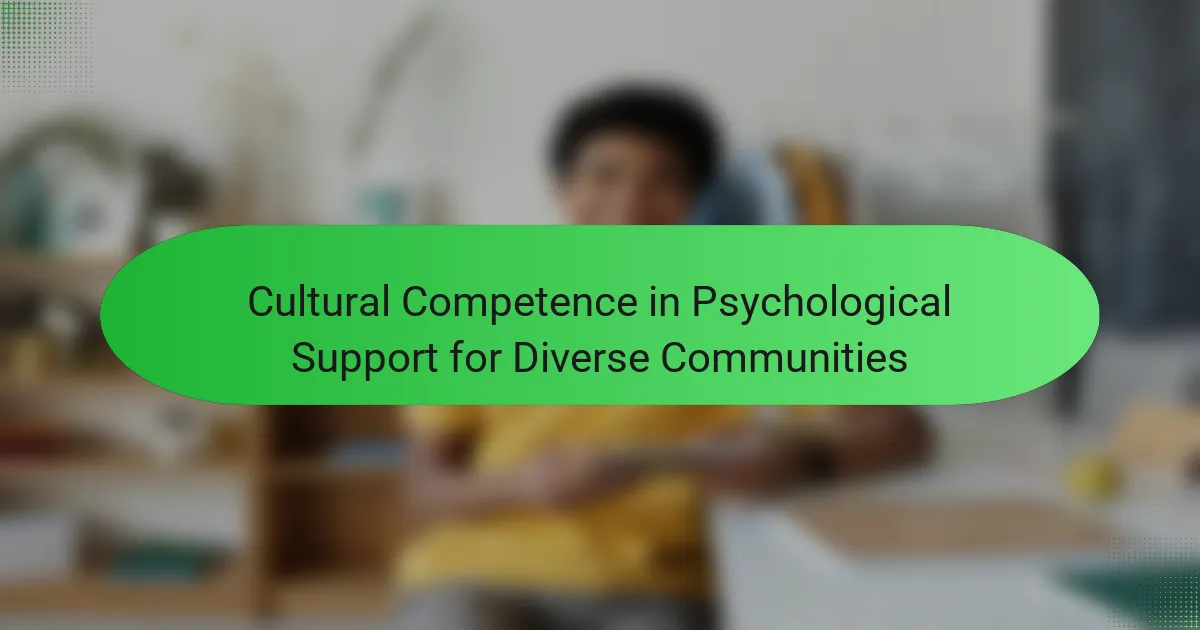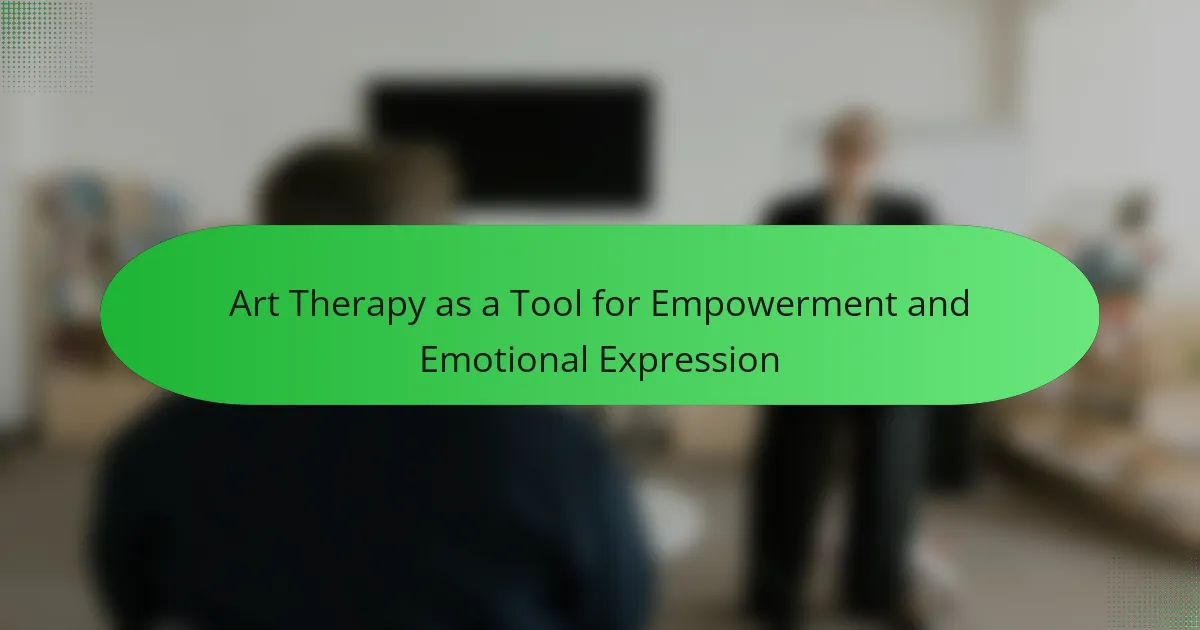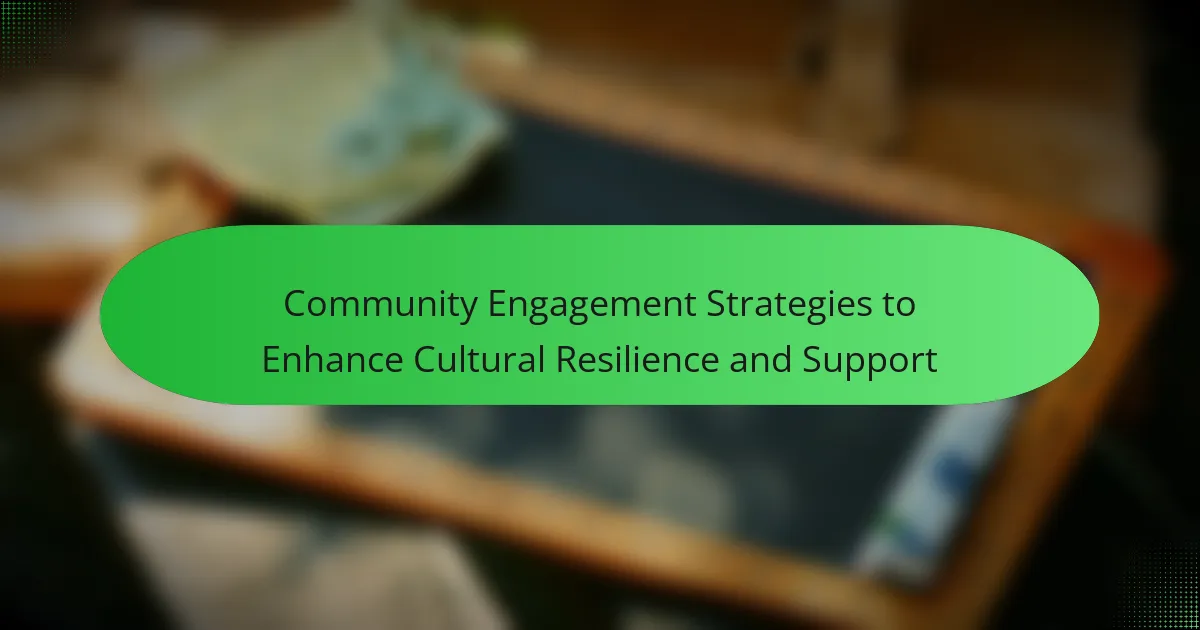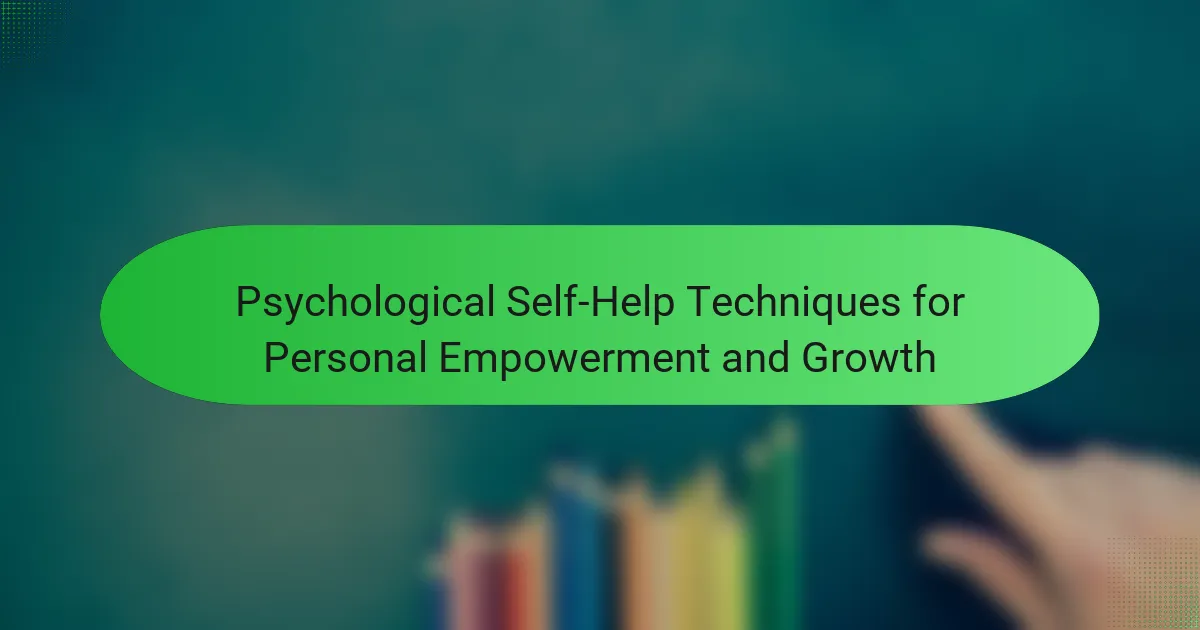Journaling techniques can significantly enhance self-reflection and personal growth. This article explores effective methods like reflective, gratitude, and goal-setting journaling. It addresses common challenges faced by beginners, highlights supportive tools and platforms for 2025, and discusses how cultural contexts can shape journaling practices. Advanced techniques such as reflective prompts and mind mapping will also be covered to deepen insights and foster development.
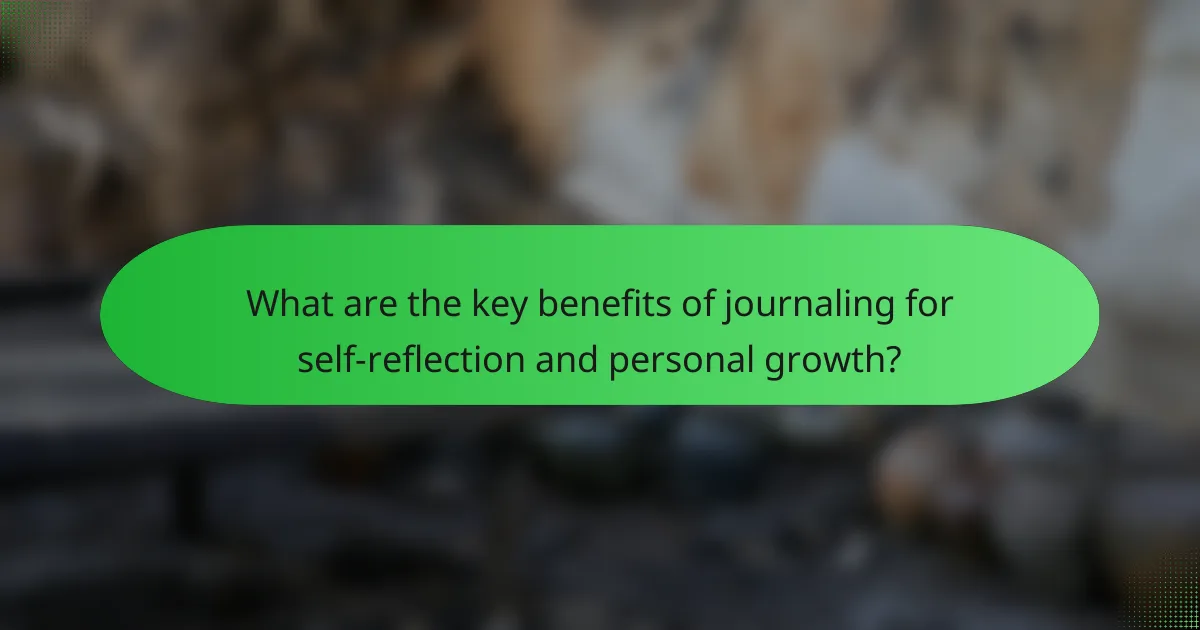
What are the key benefits of journaling for self-reflection and personal growth?
Journaling enhances self-reflection and personal growth by promoting clarity, emotional processing, and goal setting. It encourages self-awareness, allowing individuals to track their thoughts and feelings over time. Regular journaling can improve mental well-being, reduce stress, and foster a sense of accomplishment. Studies indicate that expressive writing can lead to greater psychological resilience and improved problem-solving skills.
How does journaling enhance emotional intelligence?
Journaling enhances emotional intelligence by fostering self-awareness and reflection. It allows individuals to explore their thoughts and feelings, leading to better emotional regulation and empathy. Regular journaling can improve problem-solving skills and increase resilience. Research shows that expressive writing can reduce stress and clarify emotions, contributing to overall personal growth.
Why is self-awareness crucial in the journaling process?
Self-awareness is crucial in the journaling process because it fosters deeper insights into thoughts and emotions. This understanding enhances personal growth by identifying patterns and triggers in behavior. By reflecting on experiences, individuals can set meaningful goals and track their progress. This unique attribute of self-awareness allows for transformative changes in mindset and habits.

Which journaling techniques are most effective for personal development?
Effective journaling techniques for personal development include reflective journaling, gratitude journaling, and goal-setting journaling. Reflective journaling promotes self-awareness by encouraging individuals to analyze their thoughts and experiences. Gratitude journaling enhances positivity by focusing on appreciation for daily life. Goal-setting journaling helps track progress and motivates individuals to achieve their aspirations. Each technique offers unique benefits that contribute to personal growth and self-discovery.
How can free writing facilitate deeper insights?
Free writing enhances self-reflection by allowing unfiltered expression of thoughts and emotions. This technique promotes deeper insights by encouraging a flow of ideas without self-censorship. As a result, individuals can uncover hidden feelings and patterns in their thinking. Engaging in free writing regularly can lead to greater clarity and understanding of personal experiences.
What role does gratitude journaling play in mental well-being?
Gratitude journaling significantly enhances mental well-being by fostering positive emotions and reducing stress. This technique encourages individuals to reflect on their daily experiences and appreciate the good in their lives. Research indicates that regular gratitude practice can lead to improved mood, better sleep, and increased resilience. By focusing on positive aspects, individuals can shift their mindset, promoting a more optimistic outlook. This practice serves as a unique tool for personal growth and self-reflection, making it a valuable addition to mental health strategies.
How does structured journaling differ from creative journaling?
Structured journaling focuses on specific prompts and goals, while creative journaling emphasizes free expression. Structured journaling often includes guided frameworks that promote clarity and direction, aiding in self-reflection. In contrast, creative journaling allows for artistic freedom, encouraging exploration of thoughts and emotions without constraints. This distinction highlights how each technique serves different purposes in personal growth.
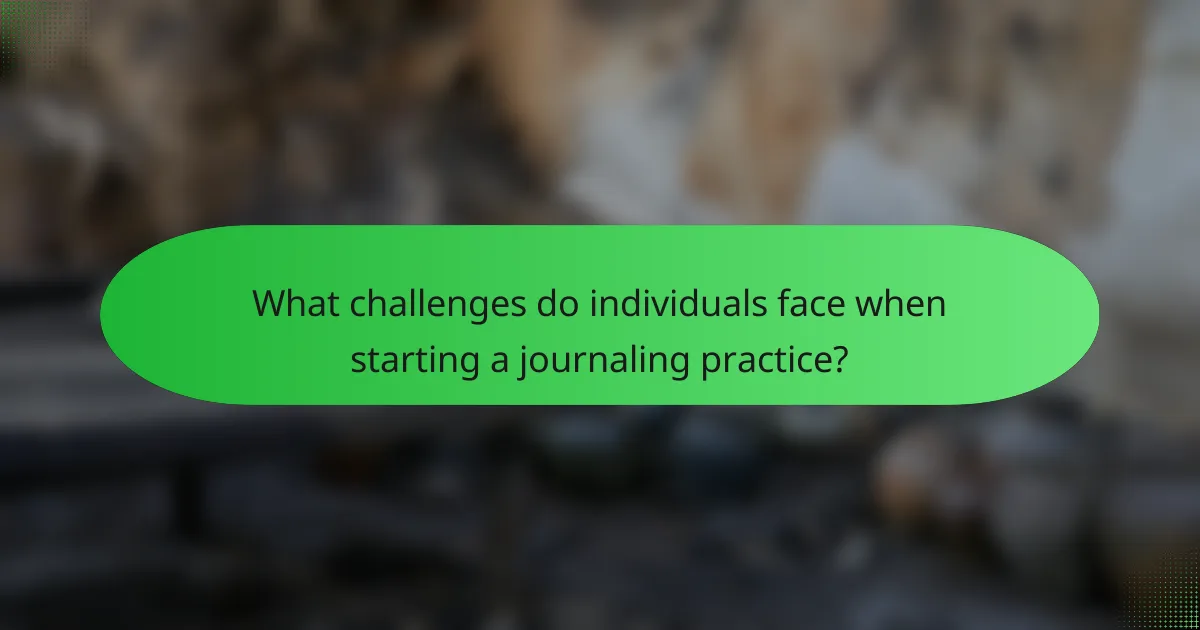
What challenges do individuals face when starting a journaling practice?
Individuals face several challenges when starting a journaling practice, including self-doubt, lack of time, and uncertainty about what to write. Many struggle with consistency, leading to sporadic entries. Others may feel overwhelmed by the idea of expressing their thoughts and emotions on paper, fearing judgment or vulnerability. Additionally, some find it difficult to establish a routine that integrates journaling into their daily lives. These barriers can hinder personal growth and self-reflection, essential aspects of effective journaling.
How can one overcome writer’s block in journaling?
To overcome writer’s block in journaling, try these techniques: free writing, setting time limits, and using prompts. Free writing allows thoughts to flow without judgment. Setting a timer encourages focused writing sessions, while prompts can spark creativity. These methods enhance self-reflection and personal growth.
What are common misconceptions about journaling?
Common misconceptions about journaling include the belief that it requires extensive writing, is only for those with mental health issues, and must follow a specific format. Many think journaling should be done daily or that it needs to be shared with others. In reality, journaling can be brief, personal, and done at one’s own pace. It serves as a versatile tool for self-reflection and personal growth, accessible to anyone seeking clarity or insight.

Which tools and platforms support journaling practices in 2025?
Several tools and platforms will support journaling practices in 2025, enhancing self-reflection and personal growth. Popular options include digital applications like Day One, which offers features like multimedia entries and prompts, and Journey, known for its cloud synchronization and community support. Additionally, platforms such as Penzu provide customizable templates for various journaling styles. For those preferring physical formats, guided journals with prompts will continue to thrive, promoting mindfulness and creativity. Lastly, social media groups focused on journaling will facilitate shared experiences and motivation among users.
How do digital journaling apps compare to traditional pen-and-paper methods?
Digital journaling apps offer convenience and enhanced features compared to traditional pen-and-paper methods. Apps provide searchability, multimedia integration, and cloud storage, making reflections easier to organize and access. In contrast, pen-and-paper methods promote mindfulness and creativity through tactile engagement.
| Attribute | Digital Journaling Apps | Traditional Pen-and-Paper Methods |
|——————————-|——————————–|————————————|
| Accessibility | High (mobile, cloud-based) | Limited (physical presence needed) |
| Features | Multimedia, reminders | Basic writing |
| Searchability | Yes | No |
| Engagement | Interactive | Tactile |
| Customization | High (fonts, layouts) | Low (fixed format) |
| Privacy | Variable (depends on app) | High (physical security) |
What features should one look for in a journaling app?
When choosing a journaling app, look for features that enhance self-reflection and personal growth. Key features include user-friendly interface, customizable templates, mood tracking, prompts for reflection, cloud synchronization, and data privacy options. These attributes ensure a tailored and secure journaling experience.

How can journaling be tailored to different cultural contexts?
Journaling can be tailored to different cultural contexts by incorporating local traditions, values, and beliefs. This personalization enhances self-reflection and personal growth through culturally relevant practices.
For instance, in collectivist cultures, journaling may emphasize community experiences and shared narratives. In contrast, individualistic cultures might focus on personal achievements and self-discovery.
Additionally, language plays a crucial role; using native languages can deepen emotional expression. Symbolism and metaphors rooted in cultural heritage can enrich the journaling experience, making it more meaningful.
Cultural rituals, such as ceremonies or storytelling, can also be integrated into journaling practices, fostering a deeper connection to one’s identity and surroundings.
What unique journaling practices are found in various cultures?
Unique journaling practices across cultures include various techniques that enhance self-reflection and personal growth.
In Japan, the practice of “Wabi-Sabi” encourages individuals to embrace imperfection in their journaling, fostering acceptance and mindfulness. In contrast, Native American cultures often utilize “Dream Journals” to document dreams and insights, promoting spiritual growth and connection to ancestral wisdom.
Chinese culture features “Gratitude Journals,” where individuals reflect on daily blessings, enhancing positivity and mental well-being. Meanwhile, in the Middle East, “Sufi Journaling” incorporates poetry and personal reflections, allowing for deep spiritual exploration and emotional expression.
These diverse practices highlight the unique attributes of journaling as a tool for personal development across different cultures.
How can cultural perspectives influence self-reflection through journaling?
Cultural perspectives shape self-reflection in journaling by influencing themes, values, and expression styles. Different cultures emphasize various aspects of personal growth, affecting how individuals interpret their experiences. For instance, collectivist cultures may focus on community and relationships, while individualistic cultures highlight personal achievements. This diversity enriches journaling practices, allowing for unique insights and deeper self-awareness. Embracing cultural influences can enhance the effectiveness of journaling as a tool for personal growth.

What are some advanced journaling techniques for seasoned practitioners?
Advanced journaling techniques for seasoned practitioners include reflective prompts, thematic journaling, and mind mapping. These methods enhance self-reflection and foster personal growth.
Reflective prompts involve asking deep, thought-provoking questions that challenge your beliefs and experiences. This technique encourages critical thinking and self-discovery.
Thematic journaling focuses on specific topics or themes over a set period. By concentrating on areas like gratitude, goals, or emotional challenges, practitioners can gain insights into their progress and patterns.
Mind mapping visualizes thoughts and ideas, allowing for a non-linear exploration of concepts. This technique helps in organizing feelings and thoughts, making connections that may not be immediately apparent.
How can prompts enhance the effectiveness of journaling?
Prompts significantly enhance journaling by providing direction and focus. They encourage deeper self-reflection, leading to more meaningful insights. Using specific prompts can help individuals explore emotions, set goals, and track personal growth over time. For instance, prompts like “What am I grateful for today?” or “What challenges did I overcome this week?” can guide thoughts and foster a structured approach to journaling. This technique cultivates a habit of consistent reflection, ultimately supporting personal development.
What methods can deepen the reflective process in journaling?
To deepen the reflective process in journaling, incorporate techniques such as free writing, prompts, and thematic exploration. Free writing encourages unfiltered expression, allowing thoughts to flow without judgment. Using prompts can guide reflections on specific topics, enhancing focus. Thematic exploration involves examining recurring themes in your life, fostering deeper insights. These methods enhance self-awareness and promote personal growth.
How can visualization techniques be integrated into journaling?
Visualization techniques can enhance journaling by facilitating deeper self-reflection and personal growth. Integrating imagery, diagrams, or sketches into journaling can clarify thoughts and emotions.
1. Mind Mapping: Utilize mind maps to visually organize ideas and feelings, promoting clearer insights.
2. Vision Boards: Create vision boards to represent goals and aspirations, reinforcing motivation and focus.
3. Doodle Journals: Incorporate doodles or sketches to express emotions non-verbally, enabling a unique outlet for creativity.
4. Graphical Progress Tracking: Use charts or graphs to track personal growth metrics, making progress tangible and motivating.
These techniques encourage a holistic approach to journaling, fostering a richer understanding of oneself.
What are the best practices for maintaining a consistent journaling habit?
To maintain a consistent journaling habit, establish a routine, set clear goals, and create a dedicated space. Journaling daily enhances self-reflection and personal growth.
Start with a specific time each day to write. This builds a habit and makes journaling a priority. Setting achievable goals, such as writing for ten minutes, helps in sustaining the practice.
Creating a comfortable and distraction-free space encourages focus and creativity. Use prompts or themes to guide entries, making the process engaging.
Lastly, review past entries periodically to reflect on growth and insights. This reinforces the habit and highlights the benefits of journaling.
What common mistakes should be avoided in journaling for personal growth?
To enhance personal growth through journaling, avoid common mistakes such as inconsistent writing, focusing solely on negative experiences, and neglecting to set clear intentions. These errors can inhibit self-reflection and hinder progress.
Inconsistent writing leads to fragmented insights and reduces the journaling’s effectiveness. Concentrating only on negative experiences can create a skewed perspective, while failing to set intentions may result in aimless journaling without clear growth objectives.
Establishing a regular writing routine, balancing positive and negative reflections, and defining specific goals can significantly improve the journaling experience.
